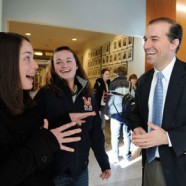
Todd, did you realize that your collar is flying free, like a wing?” my friend asked. I had missed a collar button. We laughed. How many people had noticed my weird look that morning but didn’t want to embarrass me, or embarrass themselves? True friends will clue you in on a missed button, a piece of parsley in your teeth, the occasional need for a Tic Tac or—heaven forbid!—the advice to adjust your zipper altitude. Even these simple comments are not easy to offer or, sometimes, to receive. Respectful, honest friendships, however, help protect us from “blind spots,” small and large.
Good friends share with one another a responsibility that headmasters face: providing trustworthy mirrors. Headmasters hold up the mirror for their schools, and for the many people involved in the school. When they are clear and honest, these relational mirrors allow us to see ourselves at our best, as well as our less than best.
The greater the consequences, the more difficult it is to hold up that mirror. What if more than someone’s appearance is at stake? What if a friend has acted in a way that challenges his own well-being, or his family’s? A school can do the same thing—act in inherently detrimental ways. These situations are complex, and tricky. You don’t want people to think you delight in pointing out others’ faults. Nor do you want to be known as someone who regularly judges others on standards that you don’t meet yourself. You want to be sure that you are close enough, as a friend, to offer the criticism you’re sharing. Self-awareness is a crucial attribute in a good friend.
I hope we are all fortunate enough to have trusted friends who will risk speaking with us about concerns. Being this kind of friend takes strength and courage. It’s a treasured role, but it carries great responsibility. To communicate honestly about difficult issues, this friend must accept awkward feelings and fear of judgment—even risk the friendship itself. The love of a friend—the desire to do what he or she needs most—can motivate courage of that kind.
Thinking about what defines the Milton experience, I go back to how students and alumni describe it: Miltonians always point to the depth and quality of their relationships. They point to the lasting impact of their teachers, and of their friendships. I know Milton students (past and present) and faculty members as “beautifully opinionated.” Their opinions are grounded in humility and self-awareness; these are the kind of opinions that good friends share with one another.
As Milton students move into the larger world, I hope they find the honesty and strength to “Dare to be true” to their friends. Hundreds of stories substantiate my claim that generations of Milton students care for each other in this way. Those stories make me proud of this Academy.
In daring to be true myself, I promise to be careful how, and when, and why I hold a mirror up to our School. My praise for our faculty, staff and students outweighs any list of concerns. When I do share criticism, however, I offer my reflections based in respect and love for Milton.
I am as proud of Milton’s past and present as I am confident in its future. The courage and care that Milton nurtures in children and adults, as they learn how to be the best of friends, buoys my belief in our School. More than ever, in today’s world, we need friends to help keep us safe, strong and self-aware. Milton friends are well prepared to help us with dangerous blind spots, as well as with the occasional missed button.
With great respect and admiration,
Todd B. Bland
Head of School



